Review Article
Question: What is the difference in hepatic decompensation risk between NAFLD patients with or without type 2 diabetes?
Design/Method: A meta-analysis of six cohorts of adult patients with NAFLD, including those with liver fibrosis, assessed for hepatic decompensation and death, was conducted. The primary outcome was hepatic decompensation, while the secondary outcome was the development of hepatocellular carcinoma. Competing risk regression was used to compare outcomes
Setting: The United States, Japan, Turkey
Patients/ Study community: Patients with NAFLD
Results: Type 2 diabetes is associated with an increased risk of hepatic decompensation and hepatocellular carcinoma in individuals with NAFLD. The associations remained significant after adjusting for various factors, including age, BMI, and liver stiffness
Commentary: This study emphasizes the importance of managing type 2 diabetes and glycemic control as part of the overall strategy to reduce the risk of severe liver-related outcomes in individuals with NAFLD. It also highlights the need for public health initiatives to prevent type 2 diabetes and address the increasing burden of NAFLD and its associated complications
Citation: Huang D.Q, Noureddin N, Ajmera V, Amangurbanova M, Bettencourt R. Type 2 diabetes, hepatic decompensation, and hepatocellular carcinoma in patients with non-alcoholic fatty liver disease: an individual participant-level data meta-analysis. Lancet Gastroenterology and Hepatology. 2023; 8: 829–36
DOI: 10.1016/S2468-1253(23)00157-7
https://www.thelancet.com/journals/langas/article/PIIS2468-1253(23)00157-7/fulltext
Topics: Type 2 Diabetes, Hepatic Decompensation, Hepatocellular Carcinoma, Non-Alcoholic Fatty Liver Disease


